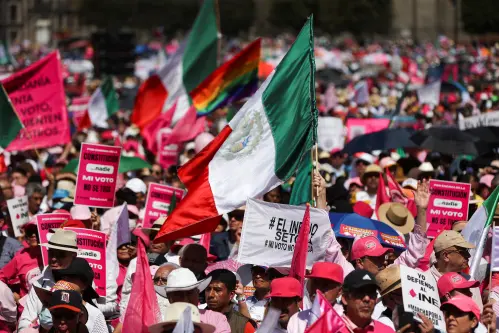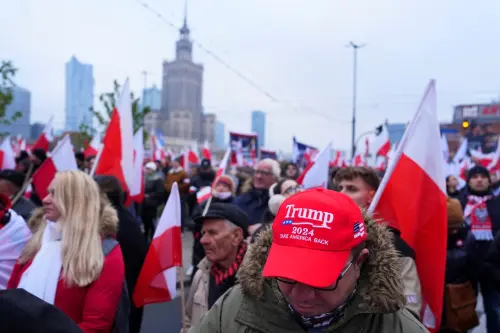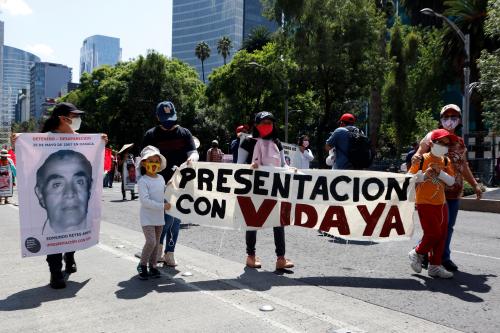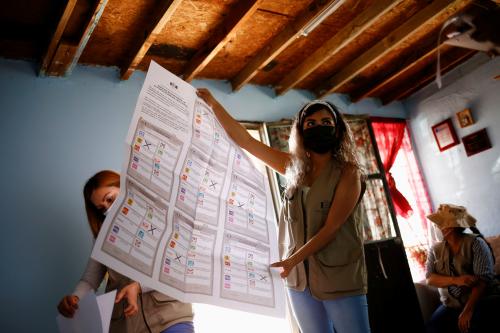On June 2, over 60 million Mexican voters elected a president, deputies of the Mexican Congress, governors of nine states, state legislators, and thousands of municipal officials. The incumbent Morena party and Claudia Sheinbaum, a close supporter of the outgoing president, Andrés Manuel López Obrador, wiped the floor with their opponents. As Mexico’s first female president—elected with the highest vote percentage of any president since Mexico’s 2001 transition to democracy—Sheinbaum will hold great power to shape Mexico’s future, including a significant ability to pass constitutional reforms. But Morena and Sheinbaum’s resounding success belies the elections’ complex dynamics and the deep security and rule of law dangers that Mexico faces.
Sheinbaum promises to continue her predecessor’s so-called “Fourth Transformation,” a social and political restructuring of Mexico that seeks to economically empower the country’s poor and marginalized, accompanied by a substantial weakening of democracy. Whether Sheinbaum will have any more will and capacity than her mentor to tackle the organized crime that is eating Mexico alive, and to which López Obrador gave carte blanche, remains to be seen. But perhaps the biggest test of Sheinbaum’s leadership will emerge even before she formally takes office—namely, how she handles the constitutional reforms that López Obrador got underway and that touch on the very essence of Mexican democracy.
A sweeping victory
Sheinbaum was elected with nearly 60% of the popular vote, dwarfing her two rival candidates. Morena, in coalition with the Green Party and Workers’ Party, won two-thirds of the seats in the Chamber of Deputies and that coalition came two votes shy of a supermajority in the Mexican Congress. Thus, to pass constitutional reforms, many of which are on the table, Morena will need to persuade two senators to join its agenda. But Mexican politics is full of so-called chapulines (grasshoppers), who jump across political parties and issues for the right payoffs. Already, Morena is composed of many such defectors from established parties.
Morena also won seven of the nine contested state governorships, even in traditional opposition strongholds. These additions give Morena control over 24 out of 32 governorships, including the powerful governorship of Mexico City. This dominance provides Sheinbaum with an opportunity to push her agenda at the federal, state, and municipal levels and achieve coordination across levels of government that has been long elusive in Mexico.
Ironically, while Morena’s success endows Sheinbaum with awesome power, it may also turn out to be her biggest challenge. The first issue is whether Sheinbaum will manage to control the disparate and fractious Morena, a hodgepodge of political opportunists with widely differing agendas.
The second issue is her mentor. Because of his continuing influence over Morena, López Obrador may cast more than a shadow over Sheinbaum’s rule if he seeks policy control. Most tangibly, in three years, Sheinbaum might face a recall referendum, a process that López Obrador created and manipulated to his advantage. This referendum allows the removal of a sitting president from office if citizens request it and 3 million signatures are collected. Given his charisma and political power, López Obrador could use the process to clip any impulses Sheinbaum may develop to deviate from his preferred policies.
The new, the good, and the bad
In a first in Mexico’s history, both of the leading presidential candidates were women—Sheinbaum for Morena, Xóchitl Gálvez for the opposition—a vindication of Mexico’s parity laws that over the past 20 years have brought far more women into politics. But this political strength is contradicted by other challenges women in Mexico face, such as high the rate of femicides: between nine and 10 per day. Sheinbaum promises to tackle violence against women by empowering a special prosecutor for femicides, as she did during her Mexico City mayorship between December 2018 and June 2023. (López Obrador has been constantly at odds with Mexico’s feminist movements.)
The two female candidates came in with strong party support, emerging victorious out of primary-like selection processes. The “primaries” were novel in Mexico where political parties had predominantly relied on closed-door methods to anoint party leaders and candidates. Out of the blue, in 2023, López Obrador announced the primary-like process for Morena, and the opposition followed suit.
The “primaries” give the selection of top politicians badly needed transparency and a popular mandate. But the absence of formal regulations and Mexican political parties’ widespread disregard for electoral authorities during the primaries also highlighted Mexico’s perpetual and defining problem: the lack of rule of law. Moreover, the primaries exacerbated party divisions in an already highly polarized country.
The elections cemented the reconfiguration of Mexico’s party system. Morena, a 2014 newcomer, consolidated its supremacy, thanks to its redistribution policies and López Obrador’s charisma. It again managed to attract new voters as well as new party operatives. Morena’s coattails also helped the traditionally weak Green Party, catapulting it to the second-strongest party in the Chamber of Deputies.
In contrast, Mexico’s established parties—the Institutional Revolution Party, the National Action Party, and the Party of the Democratic Revolution (PRD)—continued struggling. Except for Guanajuato state, they lost every contested governorship, including in traditional strongholds like Yucatán. Failing to account for past misdeeds, the decades-old parties offered little excitement for Mexican voters. PRD is now at risk of losing its party registration.
The criminals got to vote … and shoot
Disturbingly, organized crime also shaped the elections. The concluded electoral cycle broke Mexico’s political violence records. According to the Electoral Laboratory, a Mexican think tank, there were 320 documented attacks against politicians, including 93 murders that killed 37 candidates and likely contenders for office. This figure surpasses the 30 homicides reported during the 2021 election and the 24 recorded in 2018. The states with the most reported election-related violence were those with some of the highest violence among organized crime groups, such as Chiapas, Guerrero, Jalisco, Michoacán, Morelos, and the State of Mexico, and those, like Oaxaca and Puebla, where organized crime is less visible but growing.
Through assassinations and bribery, criminal groups played an unprecedented role in the elections. In much of the 20th century, they merely did the violent bidding of Mexican politicians. In the 1980s, they started bribing politicians at the national level. In the 2000s, they began intimidating elected municipal and state-level officials, demanding impunity, criminal complicity, and sometimes a hefty cut of local government budgets. These days, they actively select and promote their preferred candidates, intimidate and kill rival candidates, and dictate voting choices to local populations. And they dictate the terms of governance to elected officials, including regarding legal economies and decisions as basic as whether or not to open more liquor stores in a municipality.
Mexico’s criminal groups are continually and to an unprecedented degree expanding their control over territories, people, legal economies, and institutions. López Obrador has closed his eyes to the security troubles, hoping that if he doesn’t use force against the criminal groups, they will redivide territories and violence will decrease. That approach hasn’t worked—in fact, it’s been disastrous.
The victor’s mandate and the incumbent’s power
Sheinbaum promises to follow closely in López Obrador’s footsteps regarding the “Fourth Transformation.” López Obrador’s social reconstruction, however, also came with a massive growth in the Mexican presidency’s power, an unprecedented role of the Mexican military in the conduct of a wide array of public policy matters, and a grave weakening of democracy, featuring the dismantling of Mexico’s technocracy and attacks on independent institutions, nongovernmental organizations, and freedom of expression. López Obrador disguised his systematic dismantling of checks and balances with rhetoric against the mafia of power, i.e., not just the powerful and wealthy, but the entire political-legal-economic system decried by the populist president. Yet while his anti-corruption agenda gave him a convenient tool to use against political rivals, it has not been applied to his friends, let alone his sons.
Far from a lame-duck president, López Obrador has an enormous opportunity to use his last three months in office to ram through many further changes, including 20 major reforms he proposed in early 2024. The policy proposals, of which 18 require constitutional changes, cover a wide spectrum of issues—from universal health care and pension reform to basic institutional design. They include some of the most contentious points in Mexican politics, including the elimination of proportional representation in Congress; the dissolution or restructuring of regulatory agencies and its independent electoral body; the transfer of control of the National Guard, originally billed as a civilian-led force, to the military’s command; and the popular election of Supreme Court justices. These dramatic reforms to the judiciary and Mexico’s electoral commission, both long under attack by López Obrador, threaten to further dismantle checks and balances.
The new Mexican Congress will be inaugurated on September 1, giving López Obrador a month to advance the reforms in Congress, and two months to build support in the body politic. Already, Morena’s leader in the Chamber of Deputies announced his readiness to get the reforms passed rapidly. Surprisingly, instead of just ramming the reforms through as he is wont to do, López Obrador is talking about consulting Sheinbaum on how to implement them.
Sheinbaum’s defining moment as a leader may thus arrive even before she takes office. It will center on how she manages her relationship with López Obrador to give herself enough space for her own policy agenda and whether she will have the wisdom to prevent further democratic backsliding in Mexico.







Commentary
Mexico, López Obrador, and Sheinbaum’s presidential victory
June 10, 2024